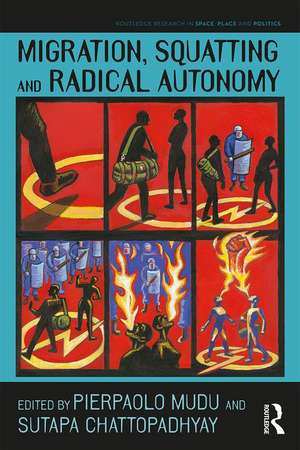Migration, Squatting and Radical Autonomy: Routledge Research in Place, Space and Politics
Editat de Pierpaolo Mudu, Sutapa Chattopadhyayen Limba Engleză Paperback – 15 feb 2018
Contributions adopt a variety of perspectives, from critical human geography, social movement studies, political sociology, urban anthropology, autonomous Marxism, feminism, open localism, anarchism and post-structuralism, to analyze and contextualize migrants and squatters’ exclusion and social justice issues. This book is a timely and original contribution through its exploration of migrations, squatting and radical autonomy.
| Toate formatele și edițiile | Preț | Express |
|---|---|---|
| Paperback (1) | 449.41 lei 6-8 săpt. | |
| Taylor & Francis – 15 feb 2018 | 449.41 lei 6-8 săpt. | |
| Hardback (1) | 1118.67 lei 6-8 săpt. | |
| Taylor & Francis – 7 iul 2016 | 1118.67 lei 6-8 săpt. |
Din seria Routledge Research in Place, Space and Politics
-
 Preț: 356.64 lei
Preț: 356.64 lei -
 Preț: 326.49 lei
Preț: 326.49 lei -
 Preț: 302.69 lei
Preț: 302.69 lei - 16%
 Preț: 324.86 lei
Preț: 324.86 lei -
 Preț: 389.38 lei
Preț: 389.38 lei -
 Preț: 448.67 lei
Preț: 448.67 lei -
 Preț: 416.22 lei
Preț: 416.22 lei -
 Preț: 409.87 lei
Preț: 409.87 lei -
 Preț: 416.22 lei
Preț: 416.22 lei - 18%
 Preț: 1002.68 lei
Preț: 1002.68 lei - 26%
 Preț: 761.76 lei
Preț: 761.76 lei - 21%
 Preț: 256.32 lei
Preț: 256.32 lei - 20%
 Preț: 272.50 lei
Preț: 272.50 lei -
 Preț: 385.41 lei
Preț: 385.41 lei -
 Preț: 389.38 lei
Preț: 389.38 lei -
 Preț: 362.89 lei
Preț: 362.89 lei - 26%
 Preț: 764.20 lei
Preț: 764.20 lei -
 Preț: 386.39 lei
Preț: 386.39 lei - 9%
 Preț: 936.56 lei
Preț: 936.56 lei
Preț: 449.41 lei
Nou
Puncte Express: 674
Preț estimativ în valută:
86.01€ • 89.46$ • 71.00£
86.01€ • 89.46$ • 71.00£
Carte tipărită la comandă
Livrare economică 14-28 aprilie
Preluare comenzi: 021 569.72.76
Specificații
ISBN-13: 9781138494480
ISBN-10: 1138494488
Pagini: 316
Ilustrații: 2 Line drawings, black and white; 4 Halftones, black and white; 3 Tables, black and white; 6 Illustrations, black and white
Dimensiuni: 156 x 234 x 17 mm
Greutate: 0.45 kg
Ediția:1
Editura: Taylor & Francis
Colecția Routledge
Seria Routledge Research in Place, Space and Politics
Locul publicării:Oxford, United Kingdom
ISBN-10: 1138494488
Pagini: 316
Ilustrații: 2 Line drawings, black and white; 4 Halftones, black and white; 3 Tables, black and white; 6 Illustrations, black and white
Dimensiuni: 156 x 234 x 17 mm
Greutate: 0.45 kg
Ediția:1
Editura: Taylor & Francis
Colecția Routledge
Seria Routledge Research in Place, Space and Politics
Locul publicării:Oxford, United Kingdom
Public țintă
Postgraduate and UndergraduateCuprins
FOREWORD Bridget Anderson INTRODUCTION Migrations, Squatting and Radical Autonomy Pierpaolo Mudu and Sutapa ChattopadhyayPART I: BORDERS AND FRONTIERS 1. From the Desert to the Courtroom: Challenging the Invisibility of the Operation Streamline Dragnet and En-masse Hearings Andrew Burridge 2. Frontex and its Role in the European Border Regime Sara Casella Colombeau 3. Undocumented Territories: Strategies of Specialization by Undocumented Migrants Henk Van Houtum and Aparna Kolar 4. Trapped on the Border: a Brief History of Solidarity Squatting Practices in Calais Calais Migrant Solidarity Group PART II: SQUATTING FOR HOUSING 5. Why Migrants Squats are a Political Issue: a Few Thoughts about the Situation in France Florence Bouillion 6. Migration and Mobilization for the Right to Housing in Rome. New Urban Frontiers? Nadia Nur and Alejandro 7. Student Migrants and Squatting in Rome at Times of Austerity Cesare di Feliciantonio 8. Palazzo Bernini: an Experience of a Multicultural Squatted House in Catania Federica Frazetta 9. The Untold Struggles of Migrant Women Squatters and the Occupations of Kottbusser Straße 8 and Forster Straße 16/17, Berlin-Kreuzberg Azozomox and Duygu Gürsel PART III: EXCLUSION, CRIMINALIZATION AND PRECARITY 10. Space Invaders: The ‘Migrant-Squatter’ as the Ultimate Intruder Stefania Grohman 11. Racialization of Informal Settlements, De-politicization of Squatting and Everyday Resistances in French Slums Thomas Aguilera 12. Emancipation, Integration, or Marginality: The Romanian Roma in Bologna and the Scalo Internazionale Migranti Fulvia Antonelli and Mimmo Perrotta 13. ‘We are here to stay’: Reflections on the Struggle of the Refugee Group "Lampedusa in Hamburg" and the Solidarity Campaign, 2013–2015 Simone Beate Borgstede PART IV: DIFFICULTIES OF DIVERSITY AND ACTION 14. Sacred Squatting: Seeking Sanctuary in Religious Spaces Serin D. Houston 15. Beyond Solidarity: Migrants and Squatters in Madrid Miguel Martínez 16. Narrating the Challenges of Women-Refugee Activists of Ohlauer Straße 12, International Women’s Space, Berlin Azozomox and International Women's Space PART V: SOCIAL CENTERS, RADICAL AUTONOMY AND SQUATTING – BEYOND CITIZENSHIP AND BORDERS 17. Trampolinehuset: An Autonomous Culture Center for Refugees in Copenhagen Tina Steiger 18. When migrants meet squatters: the case of the movement of migrants and refugees in Caserta Roman Filhol 19. Migrant Squatters in the Greek Territory: Practices of Resistance and the Production of the Athenian Urban Space Makrygianni Vasiliki 20. Natural Resource Scarcity, Degrowth Scenarios and National Borders: The Role of Migrant Squats Claudio Cattaneo 21. Euro Trash in Loïsada, New York Hans Pruijt 22. Squatting and the Illegalized Migrants’ Struggles in the Netherlands Deanna Dadusc 23. Migrations, Squatting and Radical Autonomy: conclusions Pierpaolo Mudu and Sutapa Chattopadhyay
Notă biografică
Pierpaolo Mudu is Professor in the Faculty of Urban Studies and Interdisciplinary Arts & Sciences at the University of Washington – Tacoma, USA.
Sutapa Chattopadhyay is Assisstant Professor and Visiting Researcher at Maastricht University and United Nations University, the Netherlands.
Sutapa Chattopadhyay is Assisstant Professor and Visiting Researcher at Maastricht University and United Nations University, the Netherlands.
Descriere
This book offers a unique contribution, exploring how the intersections among migrants and radical squatter’s movements have evolved over past decades. The complexity and importance of squatting practices are analyzed from a bottom-up perspective, to demonstrate how the spaces of squatting can be transformed by migrants. With contributions from scholars, scholar-activists, and activists, this book provides unique insights into how squatting has offered an alternative to dominant anti-immigrant policies, and the implications of squatting on the social acceptance of migrants.










